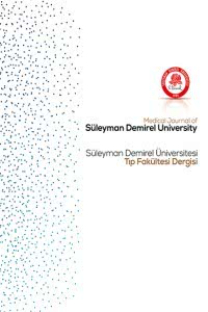Emzirme Döneminde Olan Annelerin Bebek Besleme Alışkanlıkları ve Etkileyen Faktörler
Infant Feeding Practices of Breast-Feeding Mothers and Affecting Factors
___
- 1. Anonymous, Infant and young child feding. http://www. who.int/topics/breastfeeding/en/ Erişim 11.03.2016
- 2. Anonymous, 10 facts on breastfeeding.http://www.who. int/features/factfiles/breastfeeding/en/ Erişim11.03.2016
- 3. Anonim, İlk altı ay sadece anne sütü.http://www.unicef. org/turkey/pc/_mc36.html Erişim 09.10.2015
- 4. Türkyılmaz A, Çavlin A. Çocukların ve annelerin beslenme durumu. Türkiye Nüfus ve Sağlık Araştırmaları. Ankara. Hacettepe Üniversitesi Nüfus Etütleri Enstitüsü Sağlık Bakanlığı, Kalkınma Bakanlığı. 2014. Yayın No: NEE-HÜ.14.01, 371s.
- 5. Akova S, Yazar A, Güven Ş, Aydoğdu S, Toklucu M, Tamer C. Anne sütü alan bebeklerin 0-36 ay arası büyüme ve gelişmelerinin değerlendirilmesi. Dicle Tıp Dergisi 2012; 39(4):542-546.
- 6. Açık Y, Dinç E, Benli S, Tokdemir M. Elazığ ilinde yaşayan 0-2 yaş grubu çocuğu olan kadınların bebek beslenmesi ve anne sütü konusundaki bilgi, tutum ve uygulamaları. Turkiye Klinikleri Journal of Pediatrics 1999; 8999; 8(2):53-62.
- 7. Samur G. Anne sütünün çoklu doymamış yağ asitleri bileşimi ile omega 6 /omega 3 yağ asitleri oranı. Beslenme ve Diyet Dergisi 2002;31:39-42.
- 8. Giray H. Anne sütü ile beslenme. Sted 2004;13(1):12-15.
- 9. Ünsür E, Gündoğan B, Ünsür M, Okan F. Emziren annelerin emzirme ile ilgili bilgi ve tutumlarının değerlendirilmesi. Eurasian Journal of Family Medicine 2014;3(1):33-40.
- 10. Beşbenli K,Avgen B, İncioğluA, Çetinkaya F. İstanbul'da üç farklı sosyoekonomik grupta yer alan annelerin emzirme ve bebek beslenmesi konusundaki bilgi ve davranışları. Çocuk Sağlığı ve Hastalıkları Dergisi 2013;56:76-81.
- 11. Şahin S. Süt çocuğu beslenmesinde ailelerin tutumları, gerisindeki sosyal faktörler ve sonuçlarının irdelenmesi. Ok Meydanı Tıp Dergisi 2003;20(2):34-37.
- 12. Yiğit EK, Tezcan S. Bebeklerin beslenme alışkanlıkları, çocukların ve annelerin beslenme durumu. Hacettepe Üniversitesi Nüfus Etütleri Enstitüsü,Ankara.2004:141-155.
- 13. Yiğit EK, Tezcan S. Bebeklerin beslenme alışkanlıkları, çocukların ve annelerin beslenme durumu. Türkiye Nüfus ve Sağlık Araştırması, Hacettepe Üniversitesi Nüfus Etütleri Enstitüsü, Ankara, 2003: 141-146.
- 14. Alikaşifoğlu M, Erginöz E, Taşdelen GE. Bir üniversite hastanesine devam eden annelerde tek başına anne sütü verme süresine etki eden faktörler: Türk Pediatri Arşivi 2000; 35(3): 148-155.
- 15. Ünalan P, Akgün T, Çiftçili S, Boler İ, Akman M. Why do mother attending a baby-friendly mother and child health care unit start early solid food to their babies. Turk Pediatri Arşivi 2008; 43: 59-64.
- 16. Bodur S, Yıldız H, Mermer M, Oran B. Konya il merkezinde annenin çalışma durumuna göre emzirme süresi ve ek gıda ile ilgili tutumu. Selçuk Üniversitesi Tıp Fakültesi Dergisi 2002;18:97-101.
- 17. Güneş M, Atay G, Şimşek F, Uluyol B, Suskan E, Gülnar S. Anne sütünün yetersiz alımına neden olan faktörler. 47. Milli Pediatri Kongresi, 3. Milli Çocuk Hemşireliği Kongresi Özet Kitabı, İstanbul 2003;21-23.
- 18. Bai DL, Fong DY, Tarrant M. Factors Associated with breastfeeding duration and exclusivity in mothers returning to paid employment postpartum. Matern Child Health J 2015;19(5):990-999.
- 19. Newby RM, Davies PS. A prospective study of the introduction of complementary foods in contemporary Australian infants: What, when and why? J Paediatr Child Health 2015;51(2):186-191.
- 20. Bagul AS, Supare MS. The infant feeding practices in an urban slum of Nagpur, İndia. J Journal of Clinical and Diagnostic Research 2012; 6(9):1525-7.
- 21. Chin AC, Myers L, Magnus JH. Race, education and breastfeeding initiation in Louisiana, 2000-2004. Journal of Human Lactation 2008;24(2):175-85.
- ISSN: 1300-7416
- Yayın Aralığı: 4
- Başlangıç: 1994
- Yayıncı: SDÜ Basımevi / Isparta
Bilateral Distal Tibia Metafiz Stres Kırığı
ABDULLAH MERİÇ ÜNAL, SABRİYE ERCAN
Emzirme Döneminde Olan Annelerin Bebek Besleme Alışkanlıkları ve Etkileyen Faktörler
GÜLÇİN ŞATIR, Meltem ÇELİK, Meltem KEMHACIOĞLU
İlginç bir vaka : Boyalı parmak
recep öztürk, ŞEFİK MURAT ARIKAN, Mehmet Akif ŞİMŞEK, Ömer Faruk ATEŞ, Ethem TOPTAŞ, Galip BELTİR
Ortodontide 3 Boyutlu Stereofotogrametri
Mert ÖĞRENİM, MİNE GEÇGELEN CESUR
Deneysel Kolit Modelinde Centella Asiatika Ekstresinin Etkinliği
TÜMAY ÖZGÜR, OĞUZHAN ÖZCAN, Seçkin AKKÜÇÜK, Erol KILIÇ, ONUR KOYUNCU, Cem ORUÇ, Akın AYDOĞAN, Ozan Utku ÖZTÜRK, Sedat MOTOR, İBRAHİM YETİM, Muhittin TEMİZ
Kadmiyum Verilen Dişi Sıçanlarda Üreme Sistemi Üzerine Melatonin ve Selenyumun Etkisi
İbrahim Aydın CANDAN, DİLEK BAYRAM, NİLÜFER ŞAHİN CALAPOĞLU, Nilgün GÜRBÜZ, Fatma Nihan CANKARA, MELTEM ÖZGÖÇMEN, İLKAY ARMAĞAN
